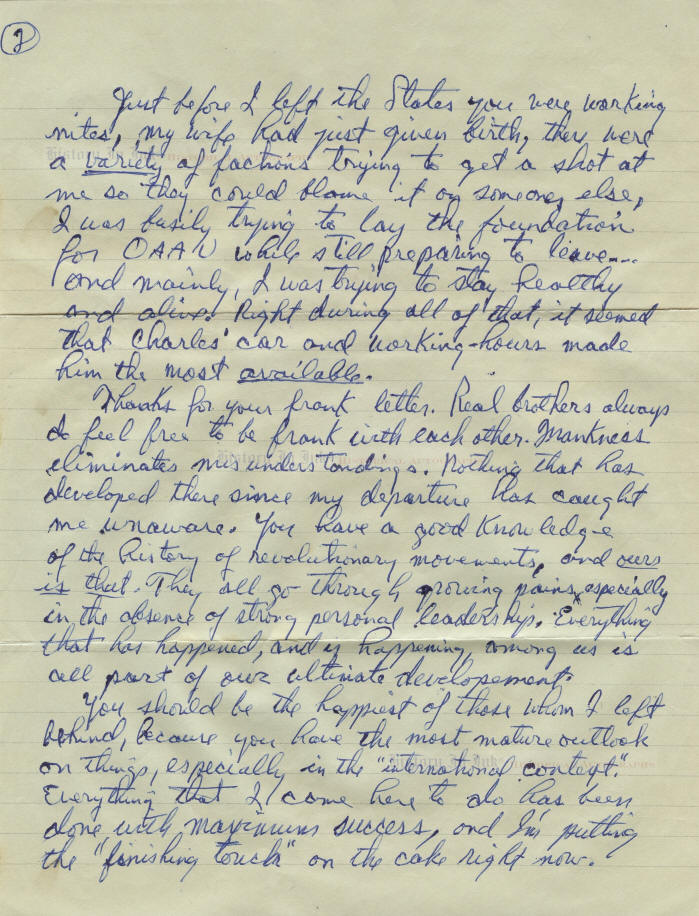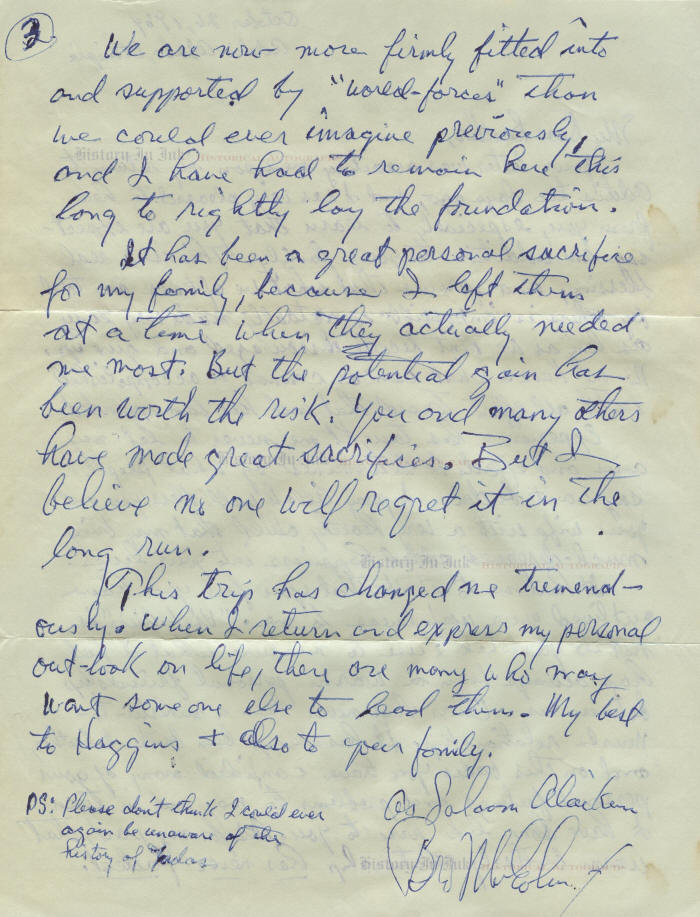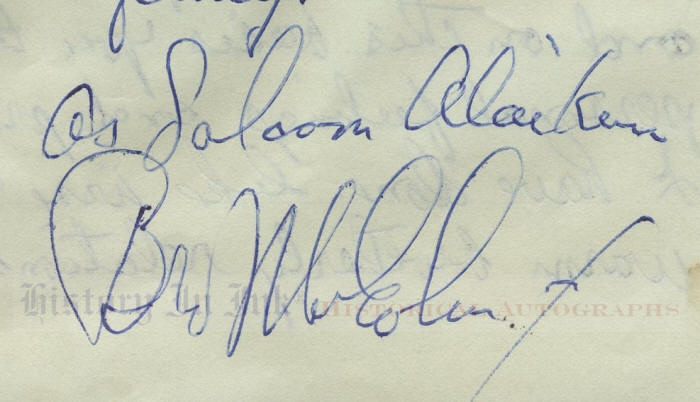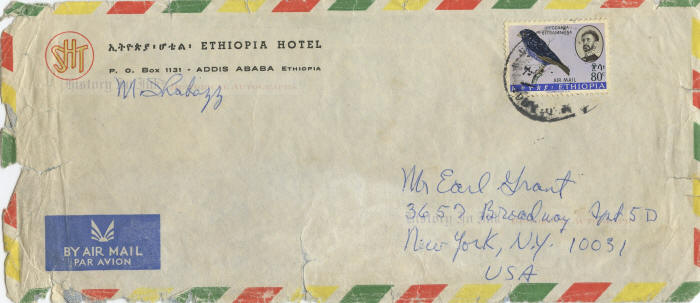




1328401
Malcolm X
The assassinated civil rights leader writes of efforts to kill him
and of his astounding metamorphosis from black militancy to racial harmony:
“Just before I left the States . . . there were a variety of factions trying to get a shot at me
so they could blame it on some one else, . . . and mainly, I was trying to stay healthy and alive. . . .
This trip has changed me tremendously. When I return and express my personal out-look on life,
there are many who may want someone else to lead them."
Malcolm X, born Malcolm Little, also known as El-Hajj Malik El-Shabazz, 1925-1965. African-American Muslim civil rights activist. Superb Autographed Letter Signed, Bro Malcolm X, three pages, 8¼” x 10¾", on plain stationery, Addis Ababa, Ethiopia, October 26, 1964. With original envelope addressed and signed, M Shabazz, by Malcolm X.
The charismatic, eloquent Malcolm X was one of the most controversial, yet influential, civil rights leaders of mid-20th Century America. Once a militant advocate of black separatism, too aggressive for the Nation of Islam's more conservative separatist leader Elijah Muhammad, and an outspoken critic of Martin Luther Kingʼs strategy of nonviolence, by the time of his assassination in February 1965 Malcolm viewed human relations through a quite different lens. With his Hajj, or pilgrimage, to Mecca in the spring of 1964, he had come to see orthodox Islam as the path to racial harmony: As he said in his Autobiography, which was published after his death, in Mecca he had seen "tens of thousands" of worldwide Muslims of “all colors, from blue-eyed blonds to black-skinned Africans,” all “participating in the same ritual, displaying a sense of unity and brotherhood that my experiences in America had led me to believe never could exist between the white and the non-white."
But it took another trip to Africa to solidify Malcolmʼs metamorphosis. He had visited there after his pilgrimage to Mecca, and although he returned to the United States in late May with different thoughts, he still believed in black separatism. In March 1964, he founded Muslim Mosque, Inc., a religious organization whose political, economic, and social philosophy, he said, would be “black nationalism." Three months later, he founded the Organization of Afro-American Unity, a secular organization, to fight for human rights for African-Americans and to promote cooperation between Africans and Americans of African descent. Malcolm saw the OAAU as an organization to “heighten the political consciousness" of African-Americans. In what became his most famous speech, he told OAAU members: “We declare our right on this earth to be a man, to be a human being, to be given the rights of a human being in this society, on this earth, in this day, which we intend to bring into existence by any means necessary."
It was not until his third African trip—the one during which he wrote this letter—that Malcolm became a truly changed man. Traveling as Malik El-Shabazz, Malcolm flew back to Africa to begin this tour in July 1964. He visited 11 African countries before stopping in France and Britain on his way back to the United States in early December. He sought to link the struggles of African-Americans with those of nonwhite people around the world and to transform the American debate over civil rights into an international debate over human rights that African-Americans could lay before the United Nations and the court of world opinion.
In this extraordinary late October 1964 letter to his close associate, his personal photographer Earl Grant, Malcolm privately documents what baseball immortal Jackie Robinson termed his "astounding change,” one that he thought might cause many African Americans to turn to another leader. “This trip,” Malcolm writes, "has changed me tremendously. When I return and express my personal out-look on life, there are many who may want someone else to lead them."
Writing from Ethiopia, Malcolm also speaks of his effort to avoid assassination, his work toward civil and human rights, and his close personal relationship with Grant, with whom he says he has a "brother-to-brother" relationship, not one of "minister-to-Muslim." After his split with Elijah Muhammad's Nation of Islam, Malcolm used the five-month trip to build world support for the OAAU and for the cause of African-American civil rights in the United States. He was greeted in many countries as though he were a head of state, attended the second meeting of the OAU in Cairo as a representative of the OAAU, and met with most of Africaʼs prominent leaders before he returned. “Everything that I came here to do,” he tells Grant in this letter, “ has been done with maximum success, and Iʼm putting the ʻfinishing touch' on the cake right now."
The full text of the letter, with Malcolm's spelling and underlining, reads:
My Dear Brother,
Your letter was awaiting me upon my return to Addis two days ago, and I was very pleased to hear from you, especially to learn that you are expecting a new addition to your family. This is a real blessing, and proves that what we oftimes are told by others is impossible is actually made very easy as long as we donʼt become discouraged and give up. No one knows what can or cannot be accomplished until all effort toward that end has been expended.
Experience has taught me never to let my aims and efforts be determined by what people say canʼt be done. I pray Allah will bless you and your wife with a very healthy child that may bring much-deserved added happiness into your lives.
It hurt me to think that you feel you have outlived your usefulness to me. “Usefulness" is not the yardstick I use to measure what I feel has always been a warn personal friendship between us. Ours has never been a minister-to-Muslim relationship. It has always been brother-to-brother, and on this basis you have confided many of your personal feelings and problems to me, and in turn I have done like wise to you. As for my part, that warm brotherly relationship has never faded.
Just before I left the States you were working nites, my wife had just given birth, there were a variety of factions trying to get a shot at me so they could blame it on someone else, I was busily trying to lay the foundation for OAAU while still preparing to leave . . . and mainly, I was trying to stay healthy and alive. Right during all of that, it seemed that Charlesʼ car and working-hours made him the most available.
Thanks for your frank letter. Real brothers always do feel free to be frank with each other. Frankness eliminates misunderstandings. Nothing that has developed there since my departure has caught me unaware. You have a good knowledge of the history of revolutionary movements, and ours is that. They all go through growing pains, especially in the absence of strong personal leadership. Everything that has happened, and is happening, among us is all part of our ultimate developement.
You should be the happiest of those whom I left behind, because you have the most mature outlook on things, especially in the “international context." Everything that I came here to do has been done with maximum success, and I'm putting the “finishing touch" on the cake right now.
We are now more firmly fitted into and supported by “world-forces" than we could ever imagine previously, and I have had to remain here this long to rightly lay the foundation.
It has been a great personal sacrifice for my family, because I left them at a time when they actually needed me most. But the potential gain has been worth the risk. You and many others have made great sacrifices. But I believe no one will regret it in the long run.
This trip has changed me tremendously. When I return and express my personal out-look on life, there are many who may want someone else to lead them. My best to Haggins & also to your your family.
As Salaam Alaikum
Bro Malcolm X
PS: Please don't think I could ever again be unaware of the history of Judas.
Robinson observed that Malcolmʼs pilgrimage to Mecca “turned him sharply from the narrow view that all nonblacks were enemies,” because Malcolm “had begun to see that it was possible to make strong alliances around the globe—white alliances as well as black—in order to solve common problems." His subsequent “travels in Africa convinced him that the chart to freedom for black America lay not in the setting up of a segregated state within America's borders, not in an approach of hate and violence, but in a grand, international coalition with African brothers." Jackie Robinson, I Never Had It Made 180 (1995). Yet Malcolm himself still was not entirely sure. He told the New York Times that he was on his own, free of the guidance of Elijah Muhammad, and added, “I won't deny I donʼt know where I'm at. But by the same token how many of us put the finger down on one point and say Iʼm here." Theodore Jones, Malcolm Knew He Was a ʻMarked Man,' N.Y. Times, Feb. 22, 1965, at 1.
Malcolm had no uncertainty, however, that his life was in danger, and, as this letter shows, he talked openly about it. In February 1964, he learned that a leader of Temple Number Seven had ordered that explosives be wired to his car. Ruby Dee, the wife of actor Ossie Davis, recalled that when Malcolm visited their house, he “didn't come in the front door; he came in the side entrance near the kitchen. He spent the time in the dining room, sitting in a chair that he placed against a wall that faced the door on one side and a window on an adjacent wall." In March, just over two weeks after Malcolm announced his departure from the Nation of Islam, Muhammad said that “hypocrites like Malcolm should have their heads cut off." In June, an unidentified man called Malcolmʼs home and told his wife Betty Shabazz to “tell him heʼs as good as dead,” and Malcolm himself told CBSʼs Mike Wallace that “I probably am a dead man already." Malcolm said in his Autobiography that he “began to see, wherever I went . . . the faces of Muslims whom I knew, and I knew that any of them might be waiting [for] the opportunity to try and put a bullet in me." He candidly confirms that in this letter, writing to Grant that before he left for Africa “there were a variety of factions trying to get a shot at me so they could blame it on someone else" and that ”mainly, I was trying to stay healthy and alive.”
The level of threats and harassment substantially increased after Malcolm returned from this trip. The family continued to live in a house that the Nation of Islam owned despite a court order evicting them, and the house was firebombed while the family was asleep early in the morning hours of February 14, 1965, the day before the scheduled court hearing to enforce the order. Malcolm, his pregnant wife, and their four young daughters escaped unharmed. Malcolm suspected that the Nation of Islam orchestrated the attack, although it denied doing so, but in his last speech on February 15 he said that circumstances were such that anyone could murder him and the Black Muslims would be blamed. In his Autobiography, he said that he knew "that any moment of any day, or any night, could bring me death" because in "any city, wherever I go, . . . black men are watching every move I make, awaiting their chance to kill me." Betty said that she received at least six or seven threats a day.
On February 16, Malcolm told Alex Haley, who ghost wrote his Autobiography, that he had been “marked for death in the next five days. I have the names of five Black Muslims who have been chosen to kill me." In an interview two days later, on February 18, he told the New York Times that “those folks down at 116th Street and that man in Chicago,” meaning his former associates in the Black Muslim movement and Muhammad, were out to kill him. “No one can get out without trouble,” he said, “and this thing with me will be resolved by death and violence." He said that he was “a marked man" who lived “like a man whoʼs already dead." He professed no animus toward Black Muslims or the Nation of Islam. Instead, he said, it was “a one-sided thing,” the work of “fanatics" who believed that they did God's will “when they go and maim and cripple those who left the movement." He knew “brothers in the movement who were given orders to kill me" and said that “highly placed people within tell me, ʻbe careful, Malcolm.'" Jones, ʻMarked Man,' at 1, 11. Two days after the interview, though, on February 20, the day before his assassination, Malcolm told Haley that he had come to question whether the Nation of Islam was indeed principally responsible. History now shows that the FBI and other law enforcement authorities had Malcolm under close surveillance, and some speculate that his relationships with the African countries, with the intention of taking the human rights debate to the United Nations, made him a target of the CIA and the State Department as well. He had been followed during his overseas trips. Now, inexplicably, he had been barred from entering France on February 9 as “an undesirable person" after speaking before he Council of African Organizations in London the day before. “Now, I'm going to tell you,” he told Haley, “the more I keep thinking about what happened to me in France, I think Iʼm going to quit saying it's the Muslims."
After an OAAU business meeting the night before Malcolm was assassinated, Earl Grant, to whom he wrote this letter, feared for Malcolmʼs safety and invited him to spend the night at his apartment. Malcolm declined, saying, ”You have a family. I don’t want anyone hurt on my account. I always knew it would end like this." Grant was one of the last people to see him alive.
On February 21, just as Malcolm began to address a meeting of some 400 OAAU members at Harlemʼs Audubon Ballroom, two men created a disturbance in the crowd. As Malcolm and his bodyguards tried to quiet things, a man armed with a double-barreled sawed-off shotgun shot Malcolm in the chest in front of his wife and children, whom he had asked to attend to hear him speak after initially telling them to stay home for safety. Two other gunmen rushed the stage with semi-automatic handguns and riddled Malcolm with bullets. He was taken across the street to Columbia Presbyterian Hospital but either was dead on arrival or died shortly after he arrived. Three members of the Nation of Islam were convicted of the murder.
Malcolm's reference in this letter to "the history of Judas" proved to be all too prophetic. In Christianity, Judas Iscariot was the apostle of Jesus Christ who turned traitor and betrayed him for money; in some Muslim interpretations, Judas instead took Jesus's place at the crucifixion. Karl Evanzz's book The Judas Factor: The Plot to Kill Malcolm X concludes that the intelligence community ordered the assassination and that the CIA recruited the assistance of one of Malcolm's former associates. Whether the theory is accurate, or whether Malcolm simply saw his former associates as turncoats or himself as the sacrifice, his comment about "the history of Judas" is a chilling prophecy from a man who knew, months before his murder, that he would die young.
Grant later assisted John Henrick Clarke with editing Malcolm X: The Man and His Times. The “Haggins" whom Malcolm mentions in this letter is probably New York photographer Robert L. Haggins, who photographed Malcolm from the late 1950s forward, capturing striking images of him with crowds during the early 1960s.
Malcolm X has boldly written and signed this letter in blue ballpoint pen. The letter has minor ¼" fold splits at the right ends of the folds on both pages; a couple of minor stains, including one to the right of (but not affecting) the signature; and normal mailing folds. Overall it is in fine condition. The accompanying envelope is addressed in Malcolmʼs hand and bears second signature as M. Shabazz. It is opened at the flap. The flap is torn partially from the body at the left end, and the left end and bottom are open at seams, with scattered paper loss and a couple of vertical tears at the bottom. Overall the envelope is in fair to good condition, but the M. Shabazz signature is fine to very fine.
Not only is this letter fully handwritten, but its content is superb, for Malcolm himself documents his metamorphosis from militant to humanist, discusses his work on civil and human rights, comments on efforts to kill him, and likely foretells his assassination. This is one of the finest letters by Malcolm X ever to be offered on the autograph market, and it belongs in the finest collection of American civil rights or Black Americana material.
Unframed.
_____________
This item has been sold, but
click here to see other
American History items
that we are offering.



